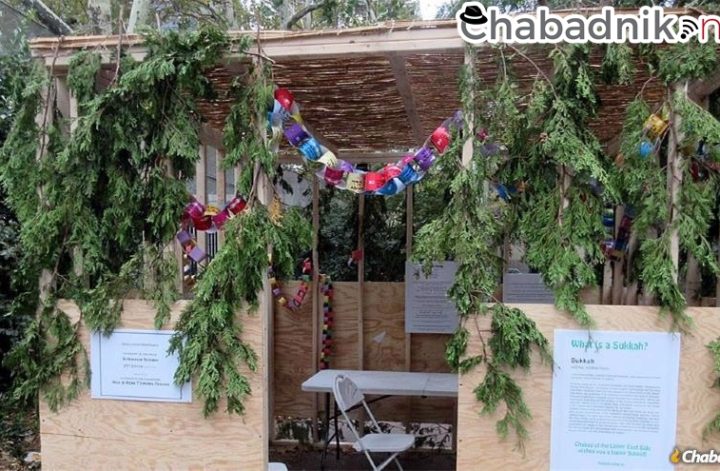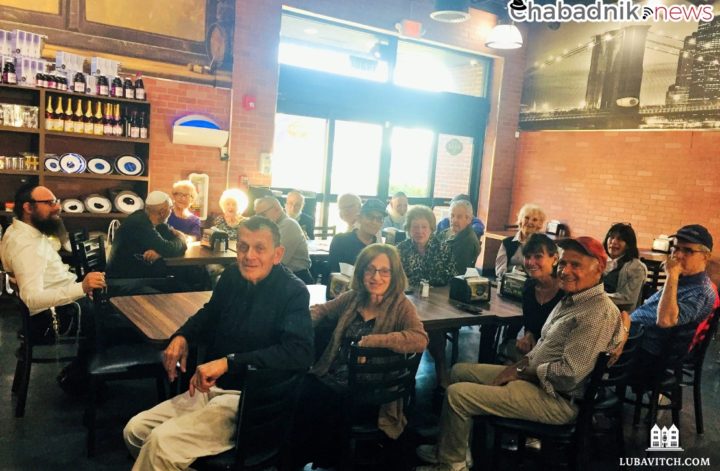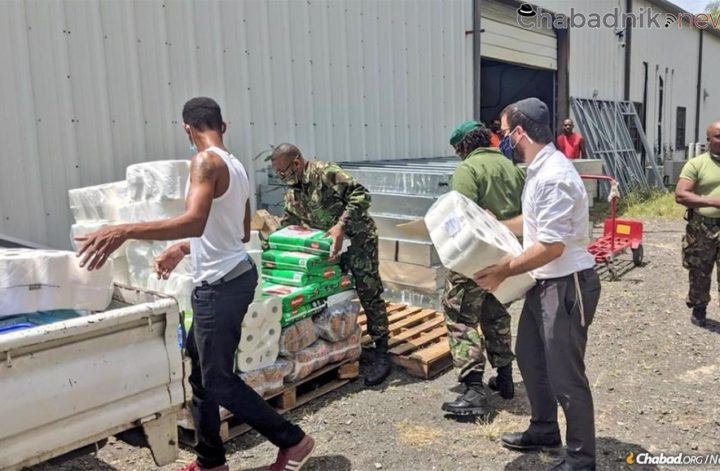The outdoor, seven-day holiday approaches with safety and unity again top of mind
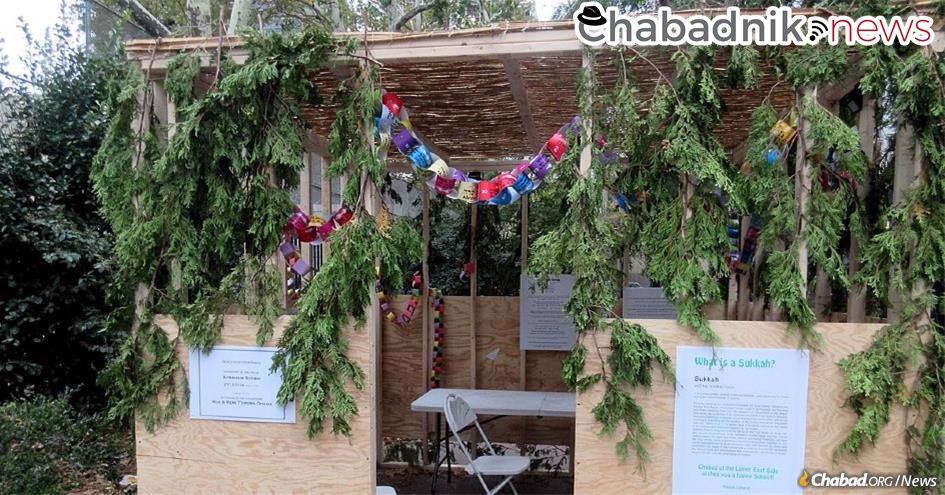
As zeman simchateinu (“the season of our rejoicing”) rapidly approaches, thousands of Chabad-Lubavitch centers worldwide are once again busy helping Jews wherever they are to safely and joyfully celebrate the holiday of Sukkot with a renewed spirit of unity and faith.
This Sukkot—observed in 2021 from before sundown on Monday, Sept. 20, and ending after nightfall on Monday, Sept. 27—will be the second in the coronavirus era, bringing with it many of the restrictions and unique opportunities for good that the world has faced over the past year-and-a-half. The seven-day holiday commemorates the miraculous clouds that surrounded the Israelites on their way to the Promised Land. It is immediately followed by the especially joyous two-day holiday of Shemini Atzeret and Simchat Torah, which end at nightfall on Tuesday, Sept. 28.
It was the unity of the Jewish people that the Rebbe—Rabbi Menachem M. Schneerson, of righteous memory—stressed when he first launched his Sukkot Campaign in the fall of 1953, and was a theme he constantly sounded in the years that followed. Over the course of Sukkot, the Jewish people are commanded to dwell in the sukkah, a walled structure covered with flora, and the Rebbe would regularly note that this applied equally to all—from the greatest of rabbis to the simplest of lay people. The Talmud even speaks of the big Sukkah within which the entire Jewish people can dwell. The same unifying principle appears in the mitzvah of the arba minim, the “Four Kinds,” in which Jews combine and make a blessing on the different species of etrog, lulav, myrtle and willow branches.
Chabad has ever since been bringing the holiday of Sukkot, its celebrations, and spirit of unity and faith in G‑d’s protection to Jews of all backgrounds and wherever they may be, inviting them to step inside the sukkah and make a blessing over the lulav and etrog. Utilizing tools old and new, Chabad-Lubavitch centers across the globe are putting the finishing touches on their coronavirus-safe Sukkot plans.
The effort will indeed be a global one: Chabad-Lubavitch is the largest Jewish organization in the world, with 3,500 educational, religious and social-service institutions in more than 100 countries and territories. According to the Pew Research Center’s 2020 Portrait of Jewish Americans, two in five Jewish adults—some 38 percent of American Jews or 2.2 million people—report having some interaction with Chabad. It’s a level of engagement that extends to Jewish communities large and small around the world.
Safety Measures in Place Worldwide

For 18 months now, since the beginning of the pandemic in March 2020, large public gatherings have been forbidden in Germany, even as restrictions have eased with vaccination efforts. “Just recently, the government announced a new plan that will allow large gatherings of up to 1,000 people, provided that all attendees can either provide proof of vaccination or a negative test result,” explained Rabbi Yochanan Gordon of Chabad-Lubavitch of Munich. “People are breathlessly anticipating the opportunity to finally gather together en masse, and we’re thrilled to host the first such event this Sukkot, with a family festival in the sukkah. Of course, we are investing resources to check everyone as they enter the facility, to ensure everyone’s safety.”
In the Florida Panhandle, Covid measures are far less restrictive, and the Pensacola Chabad Jewish Center, co-directed by Rabbi Mendel and Nechama Danow, is gearing up for a wide array of activities. “We arrived in Pensacola just three years ago, and we have met hundreds of Jewish people in the community,” said Mendel Danow. “High Holiday services were very well-attended, and we’re planning exciting Sukkot activities that will cater to the diverse population around town, including families, students, seniors and members of the nearby military base.
“Sukkot is a time of joy and unity, and it’s a wonderful chance for the greater Pensacola Jewish family to get together.”
But with many people continuing to stay close to home in other locations around the world, Chabad emissaries are once again drawing on their construction expertise to guide local Jews in constructing their own kosher sukkah. Many Chabad centers are also offering complete Sukkot-at-Home kits, including all the holiday essentials—the lulav and etrog, a holiday guide, prayer book, candles and traditional treats.
Chabad.org editors have once again created a guide to celebrating Sukkot at home for those still shut in by the pandemic. The Chabad.org/Sukkot holiday site also includes a trove of how-to guides (including a How to Build a COVID-Safe Sukkah), printable tools, video tutorials, and virtual pre-holiday experiences and classes to help everyone celebrate the holiday—with its overt theme of unity—wherever they may be, even in isolation.

The Sukkah Comes to You
The coronavirus has made things trickier but hardly impossible. Among Chabad’s Sukkot innovations is the iconic sukkah-mobile, constructed and placed on the back of a pickup truck or trailer. Recent years have seen the dawn of the Pedi-Sukkah, an even tinier sukkah on wheels hitched to the back of a bike. This year both will bring the holiday right to people’s doorstep, with sukkah-mobiles being constructed this year around the world.
That works out well for Rabbi Yosef Goldwasser of Chabad of Mobile, Ala., who creatively harnessed the name of his resident town for the Sukkot cause with the #Sukkahmobileofmobile hashtag. “We have been very successful in touching many Jewish lives in Mobile with our sukkah mobile in that past, and it’s a great way to ensure a safe touchpoint during such times,” he said.
During Sukkot, there will be armies of rabbis, rabbinical students and lay volunteers making house calls with a lulav and etrog to ensure that people isolating, especially those who may be COVID-vulnerable, are not forgotten on the holiday.
In Rome, Rabbi Menachem Lazar of Chabad-Lubavitch of Rome is coordinating a large-scale lulav and etrog distribution to people still isolated at home. “We are getting orders from all over Europe, and doing our best to ensure as many people as possible will be able to fulfill this important mitzvah for the holiday,” he told Chabad.org.
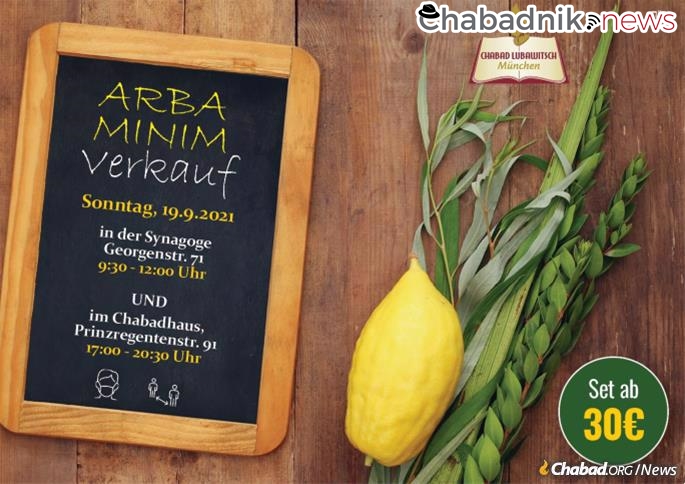
Unprecedented Joy
One of the highlights of Sukkot is the Simchat Beit Hashoevah celebrations that harken back to the Holy Temple in Jerusalem, when all-night dancing, singing and acrobatics would accompany the joyous drawing of water that was poured on the Altar each of the holiday’s seven days. In 1980, the Rebbe called for the modern revival of the festivities of old, and ever since, the celebration has taken many forms, including sit-down farbrengen gatherings in sukkahs, as well as lively dancing in the streets.
With the ongoing pandemic causing many to isolate and restrict their social interactions with their immediate family, many will be hosting their own Simchat Beit Hashoevah celebration at home.
To assist them in creating an experience that is celebratory, spiritual and user-friendly, Chabad.org is again offering a unique guide. Each day, the user is provided with an easy-to-share Torah thought and story—as well as an insight into the daily ushpizin, or “spiritual visitors.” Coupled with links to a lively dance track to play at home, everything is provided, save for the refreshments and participants, which must be sourced locally.
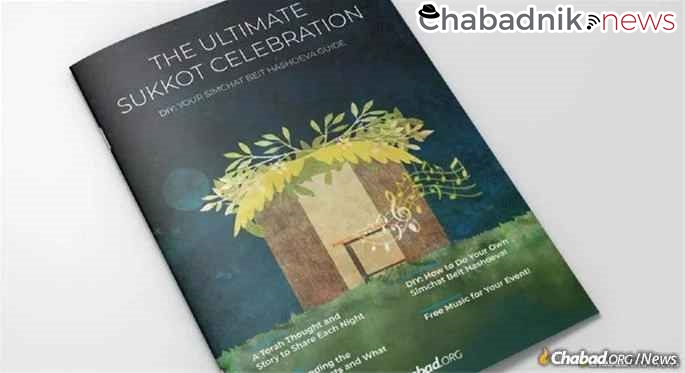
Forty-one years ago, the Rebbe penned a public letter ahead of the holiday of Sukkot (published recently in Kehot Publication Society’s Tothe Sons and Daughters of Our People Israel, Everywhere.) He explained that despite the exile and the darkness in the world, this must not dampen the joyful preparations for any holiday, much less the holiday itself, particularly not Sukkot, which is designated “the season of our rejoicing.”
“ … [A]s in the case of [the Egyptian exile], when at the height of the surrounding darkness ‘there was light for all the children of Israel in their dwellings,’” wrote the Rebbe, “a Jew’s life, wherever he may dwell, is illuminated in all its aspects by the light of Torah and mitzvot … .”
It is by intensifying this light in his or her own daily life, the Rebbe explains, that the individual is able to change for the better not only their own immediate surroundings, but transform the entire world.

